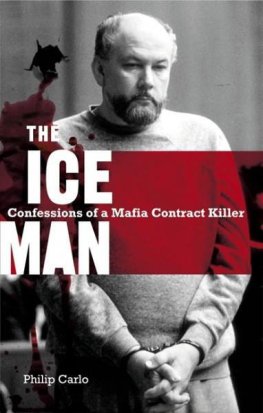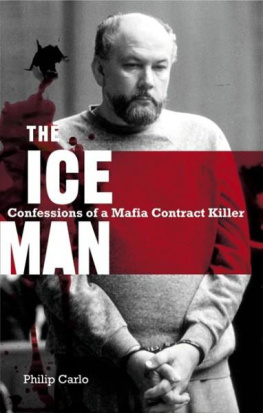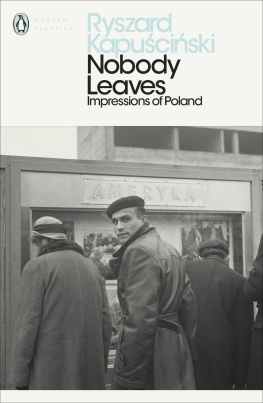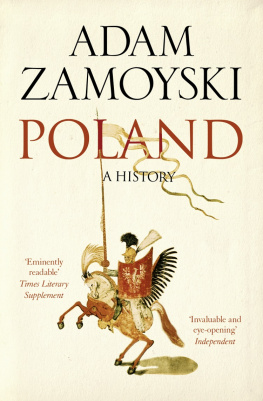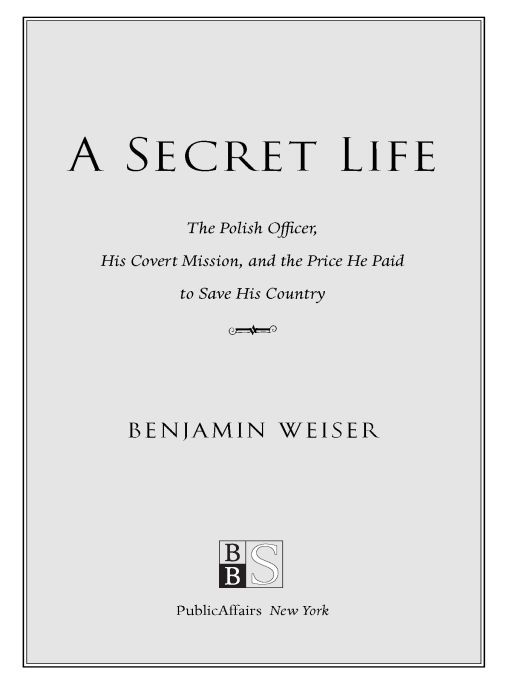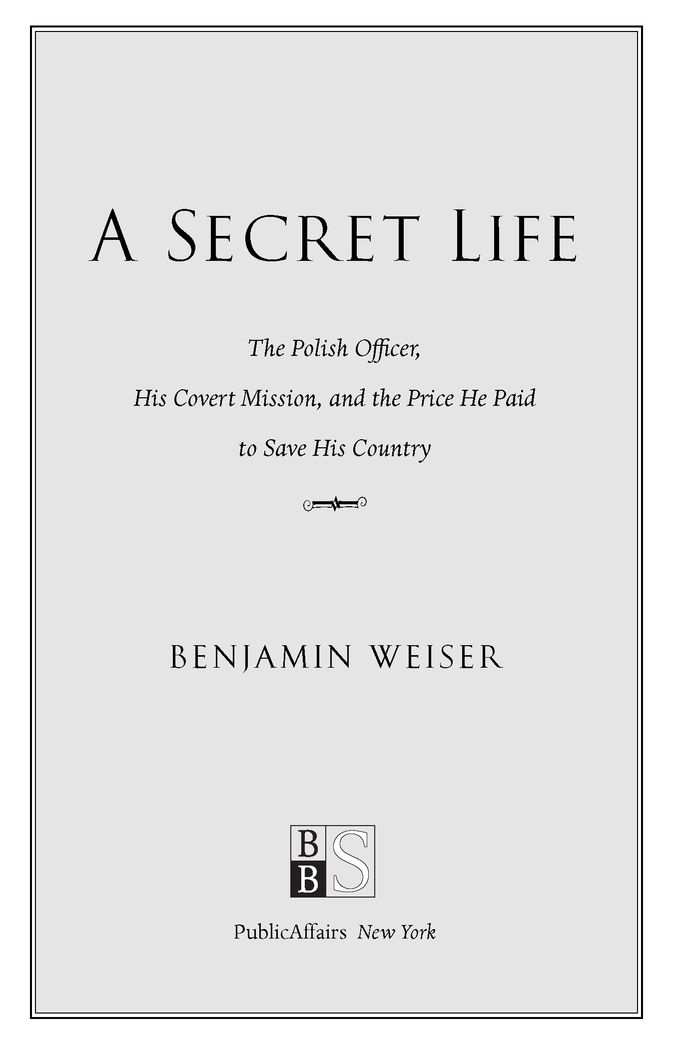Table of Contents
PRAISE FOR A SECRET LIFE
A Secret Life is a real-life spy thriller that reveals the passions and tensions faced by Polish leaders under the thumb of Moscow during the 1970s and 80s. Weiser has produced a fascinating portrayal of Kuklinski, who decided that the best way to serve Polish nationalism was to become a spy for the West... Weisers lively narrative describes Kuklinskis nine years working for U.S. intelligence, converting interviews and a mountain of documentation into a page-turner... But the human dimension is what sets the story apart.Washington Post Book World
Books about espionage, fiction or not, can be clich flypaperencrusted with tired plot twists and morbid atmosphere. Exceptions, like John le Carrs novels and Thomas Powerss histories, are rare. But Weisers tale... is in that elevated company. A Secret Life is thrilling not only in its chronicle of an honorable betrayal during the Cold Wars endgame but also in its portrait of the strangely loving epistolary relationship between the spy and his American handlers.The New Yorker
At a time when most people are focused on stories of CIA bungling, Weisers book... provides a blueprint of what an agency success ought to look like.Anne Applebaum, Newsweek International
A Secret Life is a story of danger and stolen documents, of dual identities and hair-raising risk.The Wall Street Journal
This meticulously documented real-life spy story is alive with the tension of secret meetings, clandestine handoffs, near-fatal slipups andat lasta very narrow escape to the West.Forbes FYI
Under what conditions can betrayal become an act of patriotic heroism? This moral hypothetical is cast into firm detail by Benjamin Weisers extraordinary account of Col. Ryszard Kuklinski.The Philadelphia Inquirer
A compelling and... suspenseful narrative... Weisers multilayered approach enables him to brighten and humanize the furtive world of espionage... Indeed, the longer Weiser lingers over the subtleties and quirks of Kuklinskis personality, the more intriguing an individual emerges.
Times Literary Supplement
Benjamin Weisers booklucid, authoritative, and unputdownableis a must-read for scholars of the Cold War, and for all of us who lived in the shadows of totalitarianism and enjoy the fruits of the ultimate triumph of liberty.National Review
The story of one of the more remarkable CIA coups ever... the operational history of Gull is among the most authentic accounts you are likely to read of a CIA operation.The Washington Times
Superb; it should be must reading for anybody interested in intelligence matters, the Cold War, or simply a good read.CIAs Studies in Intelligence (Unclassified)
Both a gripping spycraft procedural and a study of the moral tension of simultaneously collaborating with and undermining a system one detests, the book sheds light on a shadowy but evocative aspect of life under Communism.Publishers Weekly
Weiser just may have written the best Cold War spy story yet... The strength of this true story matches Tom Clancy at his best. Grand Rapids Press
[Weiser] has written a fascinating account of this episode in history, the first to be based on partial access to CIA files.Commentary
I wish the book a broad readership... its never too late to get to know a man of principle, a true hero of freedom.George Weigel, syndicated columnist
A superb treatment of one of the most remarkable episodes of the Cold War... reads like a James Bond mystery but, even more amazing, it is not fiction.Zbigniew Brzezinski
A spy story for the ages, one that is not cynical, but uplifting. The anti-le Carr.Evan Thomas
For Dorothy
Dear Daniel,
... I would also like to assure you that I am deeply aware of the enormous need for pulling out of the shadows of darkness of the tightly closed communist system everything which does not serve peace of the world and freedom of nations.
In this conviction, I once more want to confirm my readiness to serve our common cause to the limits of my strength and capability....
Sincerely,
P.V.
Letter from Colonel Ryszard J. Kuklinski to the CIA
Sept. 22, 1980
INTRODUCTION
I first met Colonel Ryszard Kuklinski in 1992 in a hotel suite in Reston, Virginia. As I entered the room, he was standing in the corner by the window, a cigarette dangling from his mouth. He turned and greeted me with a broad smile. I didnt know much about him. I had read that he had been a key officer under Communist Polish Defense Minister Wojciech Jaruzelski, and that he was a crucial source for the CIA on the events in Poland in 1980-1981, leading up to the imposition of martial law and the crushing of the independent trade union Solidarity. But that day I learned something that no one had ever disclosed outside the CIA: For nine years Kuklinski had cooperated with the West against the Soviet Union and the Warsaw Pact in a clandestine operation of breathtaking scope and danger. Kuklinski told me that he had provided the CIA with tens of thousands of pages of classified Soviet and Warsaw Pact documents. They included the Soviet war plans for Europe, information on new weapons systems, hidden Soviet wartime bunkers, and Soviet preparations to invade Poland. As one CIA official later put it, his material was the touchstone, the basic standard.
I had first decided to get in touch with Kuklinski after reading in Veil, a book about the CIA by Bob Woodward, a brief description of his role in providing the martial law documents to the United States. Not knowing how to reach him, I sent him a letter through the CIAs public affairs office. The agency had been protecting Kuklinski under high security, and for good reason: He had been convicted, in absentia, of treason by a Communist-era military court and sentenced to death (the sentence was later reduced to twenty-five years). There was an outstanding warrant for his arrest in Poland.
I think I have to unveil what I have done, Kuklinski told me early in our first interview. My motivation. My goals. And the consequences of it. And lets judge based on what I have donewhat my treason was all about.
It was clear from the outset that Kuklinski, whose job on the Polish General Staff was to prepare for war with the West, was motivated by ideology. He was a proud Pole who harbored a deep rage toward the Soviet Union, which had taken control of Poland at the end of World War II, imposed a Communist regime, and effectively turned the Polish military into a subsection of the Soviet armed forces. By 1972, at the age of forty-two, Kuklinski had received a steady series of promotions, and seemed destined to become a general. But instead, he decided to take an extraordinary step that endangered his own life and placed his familys security in jeopardy. I wanted to know why.
Thus began a series of unusual interviews, held in anonymous hotel rooms and a private home in the Washington suburbs. I did not know, as each session began, where Kuklinski had arrived from, or where he went afterward to return home, and I was not told the name that he used outside our meetings. The sessions were arranged by the CIA, which initially had a representative attend the interviews, although the CIA officer did not attempt to control what Kuklinski told me. (After I decided to write this book, I continued to interview Kuklinski over the years, by phone and in person, without the agencys presence.)


